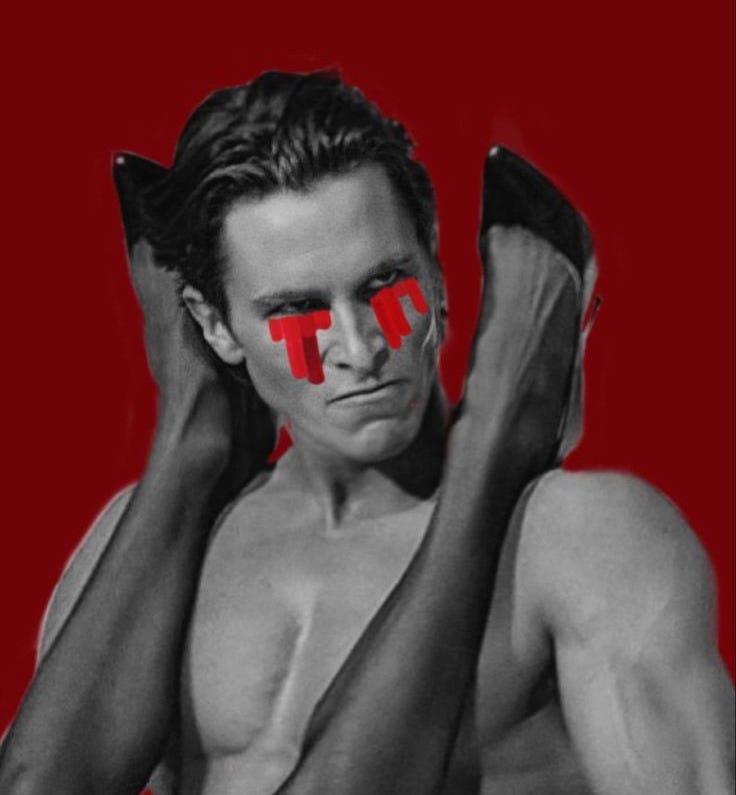Running to Red will always be a free publication, but if you’d like to support me and my work, please consider a paid subscription. 🍒
A growing crisis of masculinity, as it is being called, is driving radical shifts in how power is claimed and defended. The "masculinity crisis" is not a new concept; since the 80s, writers, commentators, and scholars have warned that men's dominance was slipping. The funny thing about patriarchy is that these inflammatory claims boil up right as women and marginalized groups gain ground in the fight for equality. Funny that.
Within this conversation, men have always been defensive to the claim that their “masculinity crisis” is manufactured by their insecurity. I can hear Ben Shapiro now crying “nooo you’re wrong.” But research shows that when masculinity feels threatened, there tends to be overcompensation — and not in ways that benefit men at large or, God forbid, creates healthy outcomes for individuals. When faced with this “crisis” and the surrounding anxiety, men are more likely to sexually harass (Maass et al., 2003), blame female victims in sexual assaults (Munsch & Willer, 2012), escalate support for war and homophobia (Willer et al., 2013), and become generally more physically aggressive (Bosson et al., 2009). Women, interestingly, don’t respond this way when their femininity is challenged (which it never is unless under the umbrella of patriarchal standards).
The manly ideal comes from what is called hegemonic masculinity (HM). HM the dominant cultural script of what a "real man" should embody: power, stoicism, toughness, and control. In the United States, HM privileges white, straight, Christian, able-bodied, wealthy men and demands strict distancing and denouncing of anything deemed feminine, queer, or the general catch-all of "weak."
The conflation of strength with masculinity is central to the American HM and has wide reaching implications. One sphere the HM has a firm grip on is, unfortunately, politics. Since the Reagan era, Republicans have leaned heavily into masculine branding and have made calculated attacks at Democrats by casting the party as "soft," “weak,” or feminized.
Donald Trump’s success can be credited heavily to this perceived masculinity threat. Threatening patriarchy and masculinity spikes support for a "masculine" president (versus simply a male one). In study after study, endorsement of HM predicted support for Trump even after controlling for race, party, gender, education, and general governmental trust. It wasn’t just sexism or racism fueling the shift, but the need for malicious control afforded to men by patriarchy.
Trump’s 2016 campaign weaponized this dynamic. He framed himself as the tough blue-collar billionaire (an oxymoron, btw) who could “drain the swamp,” beat the establishment and bring back America’s glory days (i.e. marginalized-focused violence). His attacks are never solely political. For example, his infamous mocking of disabled writer Serge Kovaleski where Trump held his arms to his chest and waved them wildly, to look as if he had a joint/muscular disability. Trump continually uses gendered insults and comparisons, casting opponents as weak, effeminate, and unfit for office.
Like moles, those threatened hid and stewed underground, plotting how to end this perceived crisis of masculinity. The influence of incels and the “manosphere” cannot be understated in Trump’s rise to power. Spaces like the "manosphere"— a cancerous web of subreddits, encrypted group chats, YouTube channels, and podcasts (barf) — have become the new echo chamber to lament feelings of rejection and loneliness, and rage into deep resentment and violence toward women and those seeking to end patriarchy.
The effects of dehumanizing women and romanticizing violence aren’t confined to the internet, or even the political sphere. Elliot Rodgers, the 2014 California spree killer, is most known for his incel manifesto posted on YouTube before beginning his reign of gunfire. He blamed women for his own lack of romantic success and ended up killing six people and injuring fourteen others. More than ten years later Rodgers is still idolized, if not deified, in the incel sphere. His manifesto was (obviously) taken off YouTube, but his loyal devotees have saved it and recycle his rhetoric for the last ten years.
I don’t have a solution for this rise in hate. I don’t think there could ever be one single answer to a multifaceted, multidecade (in regard to American HM) problem. We can’t "save" masculinity, nor do I want to. I, and we, should work to dismantle the narrow, fragile versions of patriarchal control and influence that keep power concentrated and pain invisible and unimportant. Hegemonic masculinity is not dead or dying — it’s evolving, reasserting itself through grievance and rage and violence. Men, incels, podcasters, lend me your ears. Go! To! Therapy! Because we can’t continue with our current state. Masculinity isn’t about strength. Strength isn’t about domination. Domination isn’t about love. And love shows how generously we can share power, not how desperately we can hoard it.








There is no masculinty crisis, because masculinity died with the advent of technology. All that remains is gendered pretension.